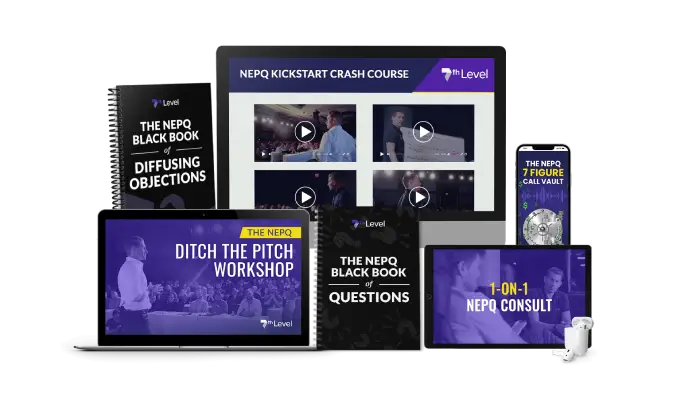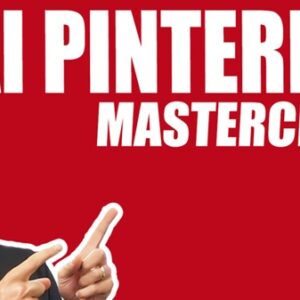NEPQ Black Book Bundle Jeremy Miner
$97.00 Original price was: $97.00.$15.90Current price is: $15.90.
- Delivery: You Will Receive A Receipt With Download Link Through Email.
- If you need more proof ofcourse, feel free to chat with me!

Sales Page: https://nepqtraining.com/go-2
Delivery Time: Instant DownloadDescription
Table of Contents
ToggleUnlocking Sales Success with the NEPQ Black Book Bundle by Jeremy Miner. When it comes to sales, understanding the psychology behind buyer behavior is key. The black book bundle jeremy miner offers a revolutionary approach to sales that prioritizes understanding prospects’ needs instead of merely pushing products onto them. This method not only enhances rapport between salespeople and their clients but also results in higher closing rates. With tools like the Neuro-Emotional Persuasion Questions (NEPQ), sales professionals can transform their approach and achieve remarkable success.

Understanding the NEPQ Black Book of Questions by Jeremy Miner
Introduction to NEPQ
The landscape of sales has evolved significantly over the years. Traditional methods often involved aggressive selling tactics that could make potential customers feel uncomfortable or pressured. Fortunately, today’s top-performing sales strategies focus on emotional intelligence and empathy. One such strategy is NEPQ, which has been developed to foster deeper connections with prospects through the art of questioning.
At its core, NEPQ stands for Neuro-Emotional Persuasion Questions. It emphasizes the importance of engaging with prospects on an emotional level, allowing them to articulate their needs and desires. This approach leads to more meaningful interactions, where prospects feel valued and understood rather than just another target for sales conversion.
Overview of Neuro-Emotional Persuasion Questions
NEPQ entails a systematic questioning process designed to unlock the prospect’s thoughts and feelings. Instead of presenting a monologue filled with features and benefits, sales professionals can engage in a dialogue that uncovers the underlying motivations of their clients. This change in tactic yields better insights into how to meet client needs effectively.
By integrating psychological principles into the sales process, NEPQ fosters an environment conducive to genuine conversation. Prospects are more likely to share their pain points, aspirations, and objections when they perceive the salesperson as a trusted guide rather than a pushy hawker. Thus, sales become less about manipulation and more about collaboration towards a shared goal.
The Evolution of Sales Techniques
Historically, sales techniques have been rooted in assertiveness rather than authenticity. The move towards a more empathetic approach marks a significant evolution within the profession. Today’s consumers are savvier; they conduct research, seek recommendations, and are generally wary of traditional sales pitches.
In response to this shift, Jeremy Miner’s NEPQ framework emerges as a beacon for those looking to excel in sales without compromising integrity. By focusing on helping prospects sell themselves, the method not only encourages ethical practices but also cultivates long-term relationships built on trust.
The Philosophy Behind NEPQ
Selling vs. Helping: A Paradigm Shift
A fundamental aspect of NEPQ is its philosophy that distinguishes ‘selling’ from ‘helping.’ Many salespeople view their role solely as persuaders, leading them to prioritize closing deals over nurturing relationships. In contrast, NEPQ champions the idea that sales should be viewed as a service, where the primary goal is to help clients find solutions that genuinely meet their needs.
This paradigm shift requires a mindset change among sales professionals. When salespeople adopt a helping mentality, they naturally gravitate towards asking questions that reveal the true motivations of prospects. This approach positions them as partners in the buying process, rather than adversaries trying to win a sale at any cost.
The Importance of Question-Based Dialogue
At the heart of NEPQ lies the belief that questions are the most powerful tool in sales. Unlike statements that deliver information, questions invite engagement. They encourage prospects to think critically about their own situations and the solutions being offered.
Crafting compelling questions involves understanding the nuances of human emotion and motivation. For instance, rather than simply asking about a product’s features, a salesperson might inquire about the challenges a prospect faces and what impact resolving these challenges would have on their life. Such inquiry reveals deeper insights and opens pathways to tailor solutions that resonate deeply.
Core Concepts of the NEPQ Model
Definition and Significance of NEPQ
Neuro-Emotional Persuasion Questions represent a sophisticated approach to sales that delves into the neurological and emotional aspects of decision-making. Rather than relying solely on logical reasoning, NEPQ acknowledges that emotions play a crucial role in how people make purchasing choices.
Understanding this connection provides sales professionals with the ability to influence decisions positively. By using NEPQ, they can tap into the emotional triggers that drive behavior, creating a more impactful sales experience that resonates on a personal level.
The Four-Step NEPQ Process Explained
The NEPQ model consists of four essential steps: Connect, Diagnose, Deepen, and Guide. Each step builds upon the last, creating a structured yet flexible approach to navigating conversations with prospects.
- Connect: This initial phase focuses on establishing rapport and building trust. Effective connection sets the stage for open communication.
- Diagnose: Here, salespeople ask targeted questions to uncover the specific needs and motivations of the prospect. This diagnostic phase is critical for identifying pain points.
- Deepen: In this step, sales professionals explore the emotional ‘why’ behind the prospect’s situation. Understanding motivations creates opportunities to present personalized solutions.
- Guide: Finally, the guide phase involves leading prospects toward commitment without resorting to heavy-handed closing tactics. This collaborative approach ensures that the prospect feels ready to make a decision.
Step One: Connect
Establishing Rapport with Prospects
The connecting phase is perhaps one of the most significant components of the NEPQ model. Establishing rapport allows sales professionals to create a safe space for prospects to express their thoughts and concerns. The foundation of this rapport lies in genuine interest and active listening.
Taking the time to understand a prospect’s background, experiences, and challenges fosters trust. Simple gestures such as eye contact, nodding, and reflective listening can significantly enhance the connection. Moreover, employing light-heartedness and humor appropriately can break the ice and create a comfortable atmosphere.
Strategies for Reducing Resistance
Prospects often come into conversations guarded, wary of being sold to. Thus, reducing resistance is paramount during this stage. Transparency about intentions helps alleviate fears. For example, expressing that the purpose of the conversation is to explore how you can assist them rather than to ‘close the deal’ creates openness.
Furthermore, utilizing open-ended questions invites prospects to share their experiences. Phrasing questions like “What challenges are you currently facing?” rather than closed questions that prompt yes or no answers paves the way for richer dialogue.
Step Two: Diagnose
Importance of Understanding Needs and Motivations
Diagnosis is where the magic of NEPQ truly happens. By digging deep into the needs and motivations of prospects, sales professionals can uncover insights that transform the sales conversation. Recognizing that each person’s circumstances are unique is crucial; thus, tailored solutions emerge from a thorough understanding of individual challenges.
Understanding the emotional drivers behind purchasing decisions allows salespeople to align their offerings with the aspirations of the prospect. This alignment fosters a sense of partnership, as clients feel heard and validated.
Types of Engagement Questions to Utilize
Engagement questions are the lifeblood of the diagnosis phase. These questions should be crafted to elicit thoughtful responses and encourage introspection. Examples include:
- “Can you describe your current challenges?”
- “What impact do these challenges have on your daily workflow?”
- “How would resolving these issues improve your situation?”
Each question serves as a stepping stone, guiding the conversation deeper into the prospects’ thought processes and feelings. Engaging questions allow sales professionals to gather invaluable information that will inform their approach moving forward.
Step Three: Deepen
Discovering the Prospect’s “Why”
As sales professionals delve into the deepen phase of NEPQ, they focus on uncovering the emotional ‘why’ behind the prospect’s challenges. This exploration is vital for understanding what drives individuals to seek solutions.
The ‘why’ often connects to personal values, ambitions, or fears, and understanding these elements can significantly influence how solutions are presented. Salespeople can ask probing questions like, “What would achieving this goal mean for you personally?” or “What fears do you have if this issue remains unresolved?”
Tailoring Solutions Based on Insights Gained
Once valuable insights have been gathered, sales professionals can tailor their solutions creatively and effectively. This means reframing product features as benefits that address the emotional drivers uncovered during the deepen phase.
For instance, if a prospect expresses a desire for increased productivity due to family commitments, a salesperson may position their solution as a way to reclaim valuable time spent with loved ones. This kind of personalized approach resonates deeply and is far more compelling than generic sales pitches.
Step Four: Guide
Leading Prospects Towards Commitment
The guiding phase is where the culmination of the previous steps comes together. Here, sales professionals utilize the information gleaned throughout the conversation to present a clear path toward commitment without pressure.
A vital technique in this phase is to frame the discussion around mutual benefit. Phrasing such as, “Based on everything we’ve discussed, this solution seems to align well with your goals. How do you feel about moving forward?” enables the prospect to consider the next steps while feeling empowered.
Techniques for Avoiding Pushy Closing Tactics
Utilizing a guiding approach means steering clear of aggressive closing tactics that can alienate prospects. Instead, fostering a collaborative mindset is essential. Asking questions such as, “What other information do you need to feel confident in your decision?” empowers the prospect to dictate the pace of the conversation.
It’s crucial to recognize when a prospect needs more time or additional reassurances. Being attentive and responsive to their cues demonstrates respect and enhances the possibility of converting discussions into successful outcomes.
The Toolkit Offered in the Black Book
Categorized Questions for Each Sales Stage
The black book bundle jeremy miner provides a treasure trove of categorized questions tailored to each stage of the NEPQ process. This toolkit equips sales professionals with the right questions to ask at the right moments, enhancing their ability to navigate complex sales conversations effectively.
Having access to these curated questions eliminates the guesswork and anxiety that often accompanies selling scenarios. Instead of scrambling to formulate inquiries, salespeople can draw from a reservoir of proven questions that resonate with potential clients.
Crafting Proposals and Presentations Effectively
Beyond questions, the black book also contains guidance on crafting compelling proposals and presentations that reflect the NEPQ philosophy. Sales professionals learn how to structure their messaging to resonate with the emotional and rational components of decision-making.
Effective proposals highlight how solutions directly address the identified needs and motivations of the prospect. This focused approach, combined with strong storytelling, creates a narrative that captivates attention and inspires action.
Handling Objections with NEPQ
Techniques for Addressing Common Concerns
Objections are an inevitable part of the sales process, but they don’t have to derail momentum. The NEPQ methodology equips sales professionals with techniques to handle objections gracefully.
Instead of becoming defensive, employing curiosity-driven questions can uncover the root cause of the objection. For example, asking, “What specifically concerns you about this?” invites prospects to share their hesitations, opening the floor for constructive dialogue.
Turning Objections into Opportunities
Every objection is an opportunity for further engagement. When addressed thoughtfully, objections can lead to deeper conversations that ultimately strengthen the relationship. This approach aligns perfectly with the NEPQ philosophy of helping rather than selling.
Sales professionals can reframe objections as chances to provide additional value. If a prospect expresses concern about price, for instance, exploring their budget constraints while reinforcing the long-term value of the solution can turn a potential impasse into a productive discussion.
Additional Resources in the Black Book
Guidance on Referrals
The black book also includes invaluable resources on generating referrals—a powerful component of sustainable sales growth. By understanding how to leverage existing relationships, sales professionals can expand their network and tap into new opportunities.
With NEPQ, the focus remains on building trust, making it easier for clients to refer others who may benefit from similar solutions. A satisfied client becomes an advocate, facilitating organic growth through word-of-mouth recommendations.
Strategies for Board Meetings
For those engaged in higher-level sales interactions, strategies for navigating board meetings are included as part of the toolkit. Understanding the dynamics of group decision-making can enhance one’s effectiveness in securing buy-in from multiple stakeholders.
Employing NEPQ in these scenarios involves asking insightful questions that resonate with the collective goals of the board. This approach not only elevates the conversation but also positions the salesperson as a strategic partner in achieving broader organizational objectives.
Resolving Client Complaints
Best Practices for Conflict Resolution
Conflict is an inevitable part of any business relationship, but how one handles it can determine the longevity of that relationship. The black book offers practical insights into best practices for resolving client complaints effectively.
Adopting an empathetic approach is crucial in conflict resolution. Listening actively and acknowledging the client’s feelings can pave the way for positive outcomes. Questions such as “Can you help me understand what led to this situation?” demonstrate a willingness to engage and collaborate.
Building Long-term Relationships Through Resolution
Mastering conflict resolution not only addresses immediate issues but also lays the groundwork for long-term relationships. Clients who feel heard and respected are more likely to remain loyal and continue engaging in business.
Utilizing the NEPQ framework during conflict resolution means treating complaints as opportunities for improvement. Following up after a resolution to ensure satisfaction reinforces commitment to quality service and fosters trust.
Target Audience for the NEPQ Black Book
Who Can Benefit from NEPQ?
The black book bundle jeremy miner caters to a diverse audience, ranging from seasoned sales professionals to newcomers eager to learn ethical selling practices. Anyone interested in refining their approach to sales can find immense value in the methodologies outlined in the book.
The adaptability of NEPQ makes it suitable for various industries and contexts. Whether selling high-ticket items or everyday services, the principles of emotional intelligence and effective questioning transcend traditional boundaries, paving the way for success.
Characteristics of Ideal Users
Ideal users of the NEPQ model possess certain characteristics that enhance their ability to implement its principles. A willingness to listen, an openness to adapting established techniques, and a genuine desire to help clients are hallmarks of successful practitioners.
Those poised to benefit most are individuals committed to continuous improvement and growth. Embracing a mindset of curiosity and collaboration transforms the sales process, resulting in enriched experiences for both sales professionals and their clients.
Marketing Strategy Behind NEPQ
Elements of Persuasive Sales Pages
The marketing strategies associated with NEPQ emphasize creating persuasive sales pages that resonate emotionally with potential clients. Compelling storytelling, vivid imagery, and relatable testimonials bolster credibility and engage prospective buyers.
Highlighting case studies demonstrating the transformative impact of NEPQ can also serve to attract attention. Potential clients appreciate visual representations of success, showcasing how implementing these principles has led to tangible outcomes.
Importance of Testimonials and Social Proof
Testimonials serve as powerful endorsements that validate the effectiveness of NEPQ methodologies. Incorporating real-life success stories from satisfied clients lends credibility to the approach, reassuring prospects of its viability.
Building social proof through endorsements from reputable figures in the industry strengthens the appeal of the NEPQ model. Positive reviews and testimonials act as catalysts that inspire confidence and encourage prospects to take action.
The Role of Scarcity in Sales
Utilizing Time-Limited Offers
Creating a sense of urgency can motivate prospects to make decisions more quickly. By incorporating time-limited offers into the sales strategy, sales professionals can encourage prompt action without exerting undue pressure.
Scarcity taps into the fear of missing out (FOMO) and prompts prospects to evaluate whether they want to partake in an opportunity that may soon be gone. However, it’s important to balance urgency with ethical considerations, ensuring that the scarcity feels authentic.
Creating Urgency Without Pressure
The NEPQ methodology focuses on creating urgency in a way that feels natural and respectful to prospects. Techniques such as highlighting limited stock availability or exclusive offers can ignite interest without resorting to aggressive sales tactics.
Using soft language and framing scarcity as a choice empowers prospects to decide for themselves. They feel in control, reducing feelings of pressure while simultaneously stimulating their desire to act swiftly.
Personal Journey of Jeremy Miner
From Struggling Sales Rep to Top Performer
Jeremy Miner’s journey from a struggling sales representative to a renowned expert in ethical selling is nothing short of inspiring. Facing numerous challenges early in his career, he recognized the need for a transformative approach to sales—one that prioritized genuine relationships over mere transactions.
This realization ignited his passion for studying human psychology and understanding the emotional drivers behind purchasing behavior. Drawing from his experiences, he crafted the NEPQ framework to empower sales professionals to succeed while maintaining integrity.
The Transformation Through NEPQ
Through the implementation of NEPQ, Jeremy Miner transformed not only his own sales performance but also the approaches of countless others in the industry. By prioritizing question-led conversations, he demonstrated that ethical selling yields superior results without sacrificing authenticity.
His continued dedication to teaching others the principles of NEPQ reflects his commitment to uplifting the sales profession. As more salespeople embrace this approach, the ripple effect becomes evident—higher closing rates, improved customer relationships, and a renewed sense of purpose within the industry.
Key Takeaways from the NEPQ Black Book
Mistakes to Avoid in Traditional Selling
One of the significant revelations from the NEPQ black book is the identification of common mistakes made in traditional selling. High-pressure tactics, overselling, and neglecting emotional engagement are pitfalls that can undermine successful sales efforts.
Recognizing these pitfalls allows sales professionals to pivot their strategies toward more effective practices. The NEPQ model serves as a guide to sidestep typical errors and cultivate an approach that prioritizes authenticity and empathy.
The Empowerment of the Prospect
Perhaps the most empowering takeaway from the NEPQ framework is the emphasis on prospect autonomy. By enabling prospects to articulate their needs and desires, sales professionals create a collaborative environment that enhances decision-making.
This empowerment leads to better outcomes for both parties involved and cultivates an atmosphere of trust. The result is not merely a transaction; it’s the beginning of a mutually beneficial relationship that transcends traditional sales paradigms.
NEPQ Black Book FAQs
What is the NEPQ Black Book?
The NEPQ Black Book is a 57-page guide that introduces the Neuro-Emotional Persuasion Questions (NEPQ) framework, a question-based selling model designed to help sales professionals close more deals without resorting to outdated, pushy sales tactics. The Black Book provides a collection of powerful, situation-specific questions categorized into various types, such as Connecting Questions, Situation Questions, Problem Awareness Questions, Solution Awareness Questions, Consequence Questions, and more.
What is the NEPQ approach to sales?
NEPQ stands for Neuro-Emotional Persuasion Questions. It’s a sales approach centered around asking specific types of questions designed to understand a prospect’s needs and motivations, eliminate objections before they arise, and ultimately help the prospect convince themselves to buy. This method leverages the power of questions to guide the sales conversation, build rapport, uncover pain points, and lead prospects towards a natural close.
How does the NEPQ Black Book help me close more deals?
The NEPQ Black Book provides you with a framework and specific questions to:
- Connect with prospects effortlessly: Establish rapport and melt resistance from the start.
- Diagnose their situation quickly: Uncover pain points, needs, and motivations through targeted questions.
- Understand their “Why”: Discover the emotional drivers behind their buying decisions.
- Guide them to commit: Lead them naturally towards closing without forceful tactics.
What makes the NEPQ approach different from other sales training?
Most sales training focuses on presenting, pitching, and overcoming objections. NEPQ, however, focuses on guiding the prospect to persuade themselves through a question-led dialogue. This aligns with natural human psychology, making the sales process feel less pushy and more collaborative. By understanding the prospect’s needs and motivations at a deeper level, sales professionals can address concerns proactively and create a more compelling case for their product or service.
Will the NEPQ approach work in my industry?
The NEPQ framework has been successfully tested and implemented across over 115 industries, demonstrating its versatility and effectiveness regardless of the specific product or service being sold. Its principles are rooted in human psychology, making it applicable to a wide range of sales scenarios.
Conclusion
In a world where traditional sales techniques often fall short, the black book bundle jeremy miner stands as a beacon of hope for sales professionals seeking to transform their practices. By embracing the NEPQ methodology, salespeople can engage with prospects on a profound level, unlocking potential and building lasting relationships.
The power of NEPQ lies in its ability to foster genuine connections, understand emotional motivations, and guide prospects towards informed decisions. As sales professionals equip themselves with the tools and insights found within the black book, they embark on a journey that transcends mere sales and evolves into a fulfilling vocation rooted in service and support.
Ultimately, the NEPQ framework empowers sales professionals to thrive ethically in an ever-evolving marketplace. Those willing to embrace this question-based approach will undoubtedly discover new avenues for success—not just in closing deals, but in enriching lives through the art of helping others.
Related products
-
Sale!

SMB – DNA Of Successful Trading
$5,000.00Original price was: $5,000.00.$49.00Current price is: $49.00. -
Sale!

Dan Petty – Design Full-Time Bundle
$350.00Original price was: $350.00.$14.00Current price is: $14.00. -
Sale!

[Group Buy] Masters AI for Creatives
$1,699.00Original price was: $1,699.00.$99.00Current price is: $99.00. -
Sale!

[GroupBuy] Jesse Cunningham – AI PINTEREST MASTERCLASS
$497.00Original price was: $497.00.$45.00Current price is: $45.00.

Reviews
There are no reviews yet.